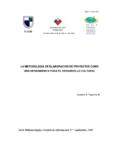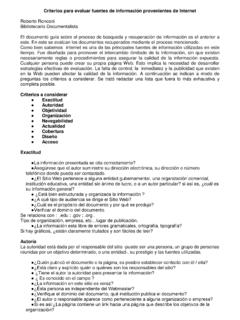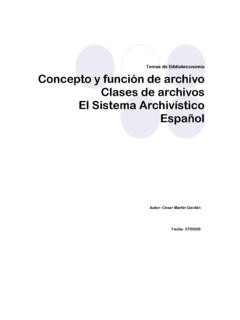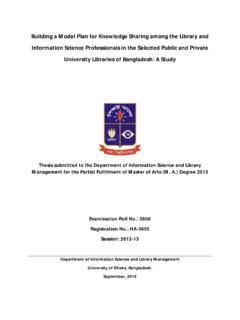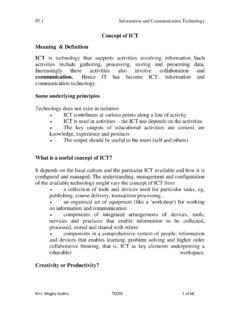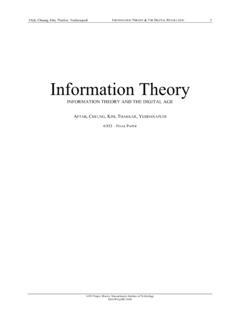Transcription of Use of Information Communication Technology (ICT) and ...
1 Proceedings: International Conference on Future Libraries: From Promises to Practices 2017 Page445 Use of Information Communication Technology (ICT) and Library Operation: An Overview Bhoi, Narendra Kumar Junior Research Fellow DRTC, ISI, Bangalore Abstract: This paper discusses the different dimension of the ICTs. It gives an awareness of Technology in library and why there is a need to understand the use of ICT in the library for rendering enhanced library services and Information to users. The current study highlights the areas where ICT can be applied.
2 Basically, the paper explains different technologies and their use in the library operation. How library services are prompted with the use of Technology like RemoteXs, RFID Technology , QR Code, etc. have discoursed in the study. The present study discusses various library operations using library automation. In this paper, the benefits of institutional repositories have been discussed for archiving the library resources. The very purpose of this study is to express the usefulness of the different ICT for quickest and approachable Information dissemination. Keywords: Information Communication Technology (ICT); Housekeeping Operation; Library Service; Library Automation; Library Operation; QR Code; RFID Technology ; Social Media; Digital Libraries 1.
3 Introduction The vital activities of libraries comprise collection development, reference services management, document delivery service, access to organised collections held by the library and assist users in Information search and retrieval (Husain & Nazim, 2015; Cholin, 2005; Malhan, 2006). There is the basic essentiality of Information Technology to manage the huge collection of library. It is indispensable to use modern Technology to make library services faster. Libraries are facing a new generation of online users who are technologically savvy and integrate Information access and use in all spheres of their lives to an unprecedented degree (Thomas & McDonald, 2005).
4 Gradually, generation is changing with the time and the present generation s library users are too passionate with the Technology . It is well known that all the success depends upon the satisfaction of the library users. So, in the present scenario the quickest library service is more approachable through the world wide web and internet (Berners Lee, Cailliau, Groff, & Pollermann, 1992). To provide Information to the right users at any time , from anywhere in the right way (Fischer, 2012) is possible using web based technological settings.
5 Tremendous development has been seen in the field of Library & Information Science due to the faster growth in Technology . In past few decades, with the use of internet and Technology , the library work has become very fast. To satisfy the needs of library users, speed and accuracy is the most two important dimension. Basically, Information and Communication Technology (ICT) enhances the workflow of the library which helps reducing manual work, with this, it proliferates the library services. One of the most prominent advantages of ICT is to provide ICT-based Information services to meet the users' demands (Woodward, 2009).
6 Emerging ICTs have changed traditional libraries into knowledge centres and librarians function more like consulting Information engineers or knowledge managers (Sampath Kumar & Biradar, 2010). The modern Technology has carried momentous changes in different aspects of library Proceedings: International Conference on Future Libraries: From Promises to Practices 2017 Page446 management. From housekeeping operation to users management, have been largely achieved through the applications of internet and library software. Basically, ICT is used in libraries, efforts to provide various services, such as - access to OPAC, library databases, automated circulation of library materials, etc.
7 Hence, ICT services have greatly impacted on each sphere of academic library activity as well as giving an opportunity to provide value-added Information services and access to a wide variety of digital-based Information resources to its users (Ghuloum, 2012). Now-a-days, Information Technology (IT) is widely used in different sectors; it is also extensively adopted in the field of library and Information services to reduce costs, enhance operational efficiency, and most importantly to improve service quality and customer experience (Law, Leung, & Buhalis, 2009).
8 2. Literature Review Recent advances in IT have not only increased tremendously the ability to access, store and process Information within the library but also have brought significant changes in the concept, organisation, functioning and management of library and Information systems (Peyala, 2011). The IT revolution has facilitated the processes of searching for and recovering Information ; ICT improves the efficiency of organizational management processes and provides new ways of improving the capacity of response to its users (L pez, Pe n, & Ord s, 2009).
9 Use of ICT applications can assist in creating, storing, transferring and using tacit and explicit knowledge (Okumus, 2013). Buarki, Hepworth, & Murray (2011) have carried out a study on ICT skills and employability needs at the LIS programme Kuwait: a literature review". In study, authors reviewed an enormous number of ICT related literature. They have concentrated on Information and Communication skills (ICT) of library and Information science students in global LIS education and compare them with those skills needed by the job market in Kuwait.
10 They found that, ICT skills have been recognised as essential qualities for LIS graduates employment . Therefore, at present days, ICTs skills have become the prerequisite and central attention to judge a candidate for the employment. Anunobi & Edoka (2010) have discussed how university library plays a pivotal role as an Information providing system; it supports teaching, learning, and research with Information materials of various types. Amongst the different Information materials, serials or periodicals are most obligatory mainly for faculties and researchers.





